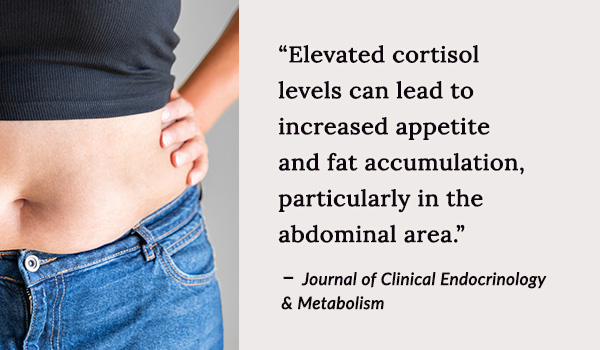Authored by Dr. Mary James, ND
I remember a patient lamenting one day about her ongoing struggles with weight. She suddenly blurted out, “It’s not fair!!!” She couldn’t understand why she was “doing all the right things” to lose weight, yet seeing no real change.

It’s easy to judge ourselves harshly for having ‘poor self-discipline’ or not being able to get it ‘right.’ Note the common message here: “Something is wrong with ME that I can’t do this!” Of course, the societal pressure on women to be thin and youthful doesn’t help. Many of the reasons you gain weight — or can’t lose it — change throughout your life. What worked in your 20s or early 30s probably won’t help you lose weight now, nor will increasing your diet and exercise.
The truth is weight loss cannot be boiled down to discipline! There are so many other reasons for weight gain and failure to shed it. Once you understand which are most relevant for YOU, you’ll be on a more effective path toward weight control.
What’s preventing YOUR weight loss?
1. YOU may be ready to lose weight, but is your BODY?
Women gain weight more easily when our system is out of balance — especially weight gain during perimenopause and menopause when the testosterone/estrogen ratio increases. Although testosterone prevents fat gain in men, it can have the opposite effect in women. Lower estrogen in menopause also impairs insulin sensitivity, giving us the likelihood of belly fat.
What’s more, low thyroid promotes stubborn weight gain, while high cortisol levels due to adrenal imbalances increase cravings for unhealthy foods and cause fat to deposit at your middle. PMS can also cause carbohydrate cravings in many women.
All of these hormonal effects or a combination of them may keep you from losing weight — despite your efforts to diet and exercise. Try taking our weight loss quiz to see if your body needs to recover from an imbalance for you to lose weight.
2. Are you eating less but not losing weight?
Does “eat less and move more” sound familiar? While the equation may be accurate, it’s an oversimplification. The amount of energy we burn depends on our metabolic rate, which varies widely and is influenced by several factors, including thyroid function, diet and physical activity.
Unfortunately for many dieters, eating less can actually lead to weight gain! When you severely cut calories, your body doesn’t know if you’re starving or on a crash diet. It simply senses danger and lowers your basal metabolic rate (BMR) to protect against weight loss — one reason you often gain weight upon return to your ‘normal’ diet.

Just as you can slow down your metabolism, you can also boost it. Avoiding crash dieting, eating a diet high in fiber but low in refined carbohydrates and saturated fats, and using herbs to support a healthy metabolism and prevent fat storage can all make a big difference.
3. Are you eating food that makes you hungry?
Even if you watch what you eat, you may be surprised at how certain types of foods can increase cravings, encourage fat gain or actually keep you from feeling full even when you’ve eaten a good meal. Take a closer look at what’s in your food — and what it could be doing to your weight.
| What’s in your food | What it’s doing to your weight |
|---|---|
| ‘Satiety’ peptides are released during eating, which suppress appetite. | Whether we’re full or want to keep eating can be controlled by which foods we select. Protein has the strongest impact on satiety; fat has the least. |
| Dietary fiber | More fiber generally means less weight gain, because of its effects on fullness and satiety. |
| Glycemic index (GI) reflects to what degree a food raises our blood sugar. | High-GI foods (like sweets and refined carbs) can make appetite soar by inducing spikes in blood sugar and insulin, and promoting insulin resistance, which encourages fat gain. |
| High-fructose corn syrup | Unlike glucose, fructose cannot induce satiety. The result? We keep eating. |
| Artificial sweeteners | They may have zero calories, but are linked to weight gain. |
| High-fat, high-sugar foods release chemicals that make us crave more. | Our body’s natural brakes on appetite can also be drowned out with exposure to these foods, especially for women. |
The truth about losing weight and keeping it off
The biggest truth when it comes to losing weight is that we are all unique. Almost every time I talk with a woman who is frustrated about trying to lose weight again and again, I get frustrated too! Instead of real answers, all the books, magazines and TV doctors continue their focus on the latest celebrity diet or “good vs. bad” food without really taking into account how a woman’s body works.
Losing weight and keeping it off really is possible once you take care of any hidden issues such as your hormonal imbalance or slow metabolism. You may even be experiencing a combination of imbalances. The best way to reveal an imbalance you didn’t know you had is to take our quick Weight Loss Quiz.
Now is the time to let go of your judgments. With the right information, you can reach your weight loss goals to look and feel great.
Ding EL, Song Y, Malik VS, Liu S. Sex differences of endogenous sex hormones and risk of type 2 diabetes: a systematic review and meta-analysis. JAMA. 2006 Mar 15;295(11):1288-99.
Rosenkilde M, Auerbach P, Reichkendler MH, et al. Body fat loss and compensatory mechanisms in response to different doses of aerobic exercise–a randomized controlled trial in overweight sedentary males. Am J Physiol Regul Integr Comp Physiol. 2012 Sep 15;303(6):R571-9.
Veldhorst M, Smeets A, Soenen S, et al. Protein-induced satiety: effects and mechanisms of different proteins. Physiol Behav. 2008 May 23;94(2):300-7.
Gaillard D, Passilly-Degrace P, Besnard P. Molecular mechanisms of fat preference and overeating. Ann N Y Acad Sci. 2008 Oct;1141:163-75.
Slavin JL. Dietary fiber and body weight. Nutrition. 2005 Mar;21(3):411-8.
Flint A, Møller BK, Raben A, et al. Glycemic and insulinemic responses as determinants of appetite in humans. Am J Clin Nutr. 2006 Dec;84(6):1365-73.
Du H, van der A DL, van Bakel MM, et al. Glycemic index and glycemic load in relation to food and nutrient intake and metabolic risk factors in a Dutch population. Am J Clin Nutr. 2008 Mar;87(3):655-61.
Elliott SS, Keim NL, Stern JS, et al. Fructose, weight gain, and the insulin resistance syndrome. Am J Clin Nutr. 2002 Nov;76(5):911-22.
Fowler SP, Williams K, Resendez RG, et al. Fueling the obesity epidemic? Artificially sweetened beverage use and long-term weight gain. Obesity (Silver Spring). 2008 Aug;16(8):1894-900.
Shriner RL. Food addiction: detox and abstinence reinterpreted? Exp Gerontol. 2013 Oct;48(10):1068-74.
Avena NM, Rada P, Hoebel BG. Evidence for sugar addiction: behavioral and neurochemical effects of intermittent, excessive sugar intake. Neurosci Biobehav Rev. 2008;32(1):20-39.
Lutter M, Nestler EJ. Homeostatic and hedonic signals interact in the regulation of food intake. J Nutr. 2009 Mar;139(3):629-32
Wang GJ, Volkow ND, Telang F, et al. Evidence of gender differences in the ability to inhibit brain activation elicited by food stimulation. Proc Natl Acad Sci U S A. 2009 Jan 27;106(4):1249-54.









